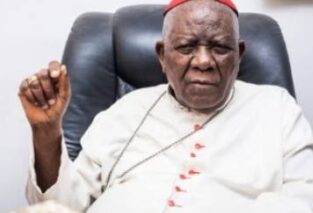(Revised and reproduced from The Post of September 10, 1996).
The title of my reflection, “The pauperisation of the Cameroonian civil servant,” sounds like a very intellectual concept, doesn’t it? It contains the kind of heavy “Sasse” words some of our writers and their critics sweat under.
Well, from time to time, I too like to be like them and that’s why I toss out a few heavy “Sasse” words of my own out of the turbulent corners of my mind, just so I can see people nodding their heads and saying to themselves, or to each other, “what a great guy we have here!” My ego does, from time to time, need to be fondled and thoroughly massaged, you know. That is why I am now respectfully and religiously placing before you the word “pauperisation” and humbly associating it with the Cameroonian civil servant.
My master, mentor, professor, teacher and, more importantly still, my friend, Bernard Nsokika Fonlon, of glorious memory, eighteen years in the grave already – May the Lord Almighty continue to envelope Bernard’s feet with fur! – always urged us, his students, to begin whatever it was we were writing with a clear definition of our terms. “Definirum terminorum”, his mellifluous, oily baritone would ring out and I can still hear it echoing so sonorously down the hallways of my ears so many years later.
Faithful to my master’s memory, this eighteenth year since our ancestors welcomed him in their midst with trumpet blasts, I also begin by defining my terms.
To pauperise, my English dictionary tells me, is, among other definitions, to reduce someone to a state of poverty. This is what I believe has happened to the Cameroonian civil servant over the past several years when Paul Biya and his altar boy, Achidi Achu, his then prime minister, made two successive dramatic raids on civil servants’ salaries, slashing them in the process by well over 70%. Kai mitafi wallah!!
Elsewhere in Africa, the streets of the land would have been littered with debris of all sorts, including corpses, as civil servants would have tossed Molotov cocktails through their frustration and torched the land with their anger, from north to south and from east to west.
Fortunately for us, we live in Cameroon and since “Cameroon is Cameroon” — a saying, which, in its day, sent many tongues wagging and many pens shedding impotent tears on paper — nothing came out of it.
Since the victims of the Biya/Achidi raid themselves never lifted a finger to defend their own rights, I said nothing myself, and would have maintained my silence had I not noticed a strange phenomenon these days among Cameroonian civil servants in their pauperised state. They all have the irritating tendency to tell whoever cares to listen how much they are earning as salaries. You barely say a word of greeting to a civil servant these days and he or she is loudly telling you how little civil servants earn these days.
“Can you believe, Tav, that I am down to barely a hundred and ten thousand francs CFA a month?”, one of them asked me the other day. “And to think that I am a medical doctor! Good Lord, is nothing sacred in this country anymore?!!”, he exclaimed, incredulity dancing in his voice.
“And what have you done about it?” I asked.
“What can I do?” he threw up his arms in the air in total resignation, tears lingering around the edges of his voice. That was when I felt like sending the Biya/Achidi duo a word of congratulation for so successfully emasculating and subduing Cameroonian civil servants and reducing them to their present pauperised state. I must admit that they have done a truly marvelous job in that area!
When you reign supreme over people, who are as cowardly as Cameroonian civil servants, people who are ready at the drop of a hat to crawl on their bellies and lick your toes instead of standing up and fighting for their rights, as our next door neighbours, who have been trying to steal Bakassi from us, would do, then your reign must be a happy one.
Let Cameroonian civil servants ask Anglophone teachers and parents how they got the Biya regime to approve the GCE Board. It was through a struggle in which every inch of ground was won with broken skulls, lost eyes, shattered limbs and bruised bodies. Why don’t they seek Dr. Francis Nyamnjoh’s advice. He has very graphically documented and immortalised the struggle for the GCE Board in his beautiful book, The Cameroon GCE Crisis: A Test of Anglophone Solidarity. He could perhaps help them to understand that it takes nerves of steel to face the Lion Man’s menacing claws.
Or is it possible that this propensity of theirs to tell you how little they earn these days — as compared with the “good old days” of the Ahidjo dictatorship — just their own way of avoiding to buy you a beer; they who are always so eager to accept a drink from you, but not so anxious to give?! The answer, Gobata would say, is blowing in the wind.


